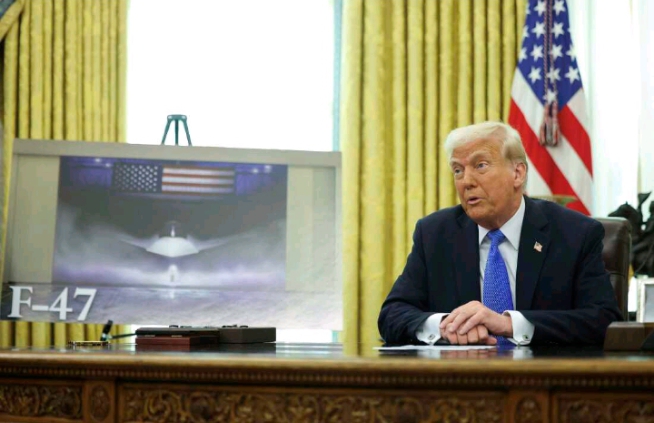By Daniel Okonkwo
In a shocking breach of U.S. military intelligence, top officials in the Trump administration mistakenly disclosed classified war plans in an encrypted Signal chat group that included a journalist from The Atlantic, the White House confirmed on Monday. The incident occurred just hours before the United States launched large-scale military strikes against Yemen’s Iran-aligned Houthi rebels on March 15.

According to The Atlantic, its editor-in-chief, Jeffrey Goldberg, was unexpectedly added on March 13 to a Signal chat group named the “Houthi PC small group.” The group consisted of senior national security and defense officials, including National Security Adviser Mike Waltz, Deputy National Security Adviser Alex Wong, Vice President JD Vance, Secretary of State Marco Rubio, Defense Secretary Pete Hegseth, CIA Director John Ratcliffe, Director of National Intelligence Tulsi Gabbard, Treasury Secretary Scott Bessent, White House Chief of Staff Susie Wiles, and other key figures from the National Security Council (NSC).
Goldberg reported that in the chat, Waltz tasked Wong with forming a “tiger team” to coordinate the U.S. response to the Houthis’ attacks on Red Sea shipping. However, the most alarming revelation came when Defense Secretary Hegseth allegedly posted operational details, including specific targets, the types of weapons to be deployed, and the sequencing of the attack. Although The Atlantic refrained from publishing the sensitive details, Goldberg called the use of a Signal chat for such discussions “shockingly reckless.”
White House Confirms Authenticity, Investigation Underway
National Security Council spokesperson Brian Hughes acknowledged that the chat appeared authentic and confirmed an investigation was in progress.
“At this time, the message thread that was reported appears to be authentic, and we are reviewing how an inadvertent number was added to the chain,” Hughes said. He defended the officials, stating that “the ongoing success of the Houthi operation demonstrates that there were no threats to our servicemembers or our national security.”
However, this explanation did little to quell the outrage from lawmakers and national security experts. Democratic Senate Leader Chuck Schumer described the breach as “one of the most stunning breaches of military intelligence that I have read about in a very, very long time.” He urged Senate Majority Leader John Thune to investigate.
Defense Secretary Pete Hegseth strongly denied the allegations, telling reporters in Hawaii, “Nobody was texting war plans, and that’s all I have to say about that.”
Goldberg responded in a CNN interview, stating, “No, that’s a lie. He was texting war plans.”
Meanwhile, Vice President JD Vance’s alleged messages in the chat raised further concerns. Screenshots obtained by The Atlantic showed him debating whether the U.S. should strike the Houthis and questioning why the U.S. was aiding Europe, given that European nations were more exposed to disruptions in Red Sea shipping.
“If you think we should do it, let’s go,” Vance reportedly wrote to Hegseth. “I just hate bailing Europe out again… Let’s just make sure our messaging is tight here.”
Hegseth allegedly responded: “VP: I fully share your loathing of European free-loading. It’s PATHETIC.”
Vance also raised concerns about the timing of the strikes, arguing that delaying by a month could be more strategic and might mitigate a potential spike in oil prices.
The disclosure raises serious legal and national security implications. Under U.S. law, the mishandling of classified information, whether intentional or accidental, can constitute a criminal offense. Additionally, the use of Signal—a private messaging app not hosted on government servers—for such high-level discussions raises concerns about violations of federal record-keeping laws.
Director of National Intelligence Tulsi Gabbard had previously warned about leaks, posting on X on March 14 that any “unauthorized release of classified information is a violation of the law and will be treated as such.” Ironically, she was part of the chat group now at the center of the controversy.
Gabbard is set to testify before the Senate Intelligence Committee on Tuesday regarding global security threats, a hearing likely to be dominated by questions about the breach.
Democratic lawmakers wasted no time in calling for accountability. Senator Elizabeth Warren described the use of Signal for sensitive military operations as “blatantly illegal and dangerous beyond belief.”
Senator Chris Coons added: “Every single one of the government officials on this text chain has now committed a crime – even if accidentally – that would normally involve a jail sentence.”
Even some Republican figures have expressed concern, with Senate Majority Leader John Thune stating, “We’re just finding out about it. But obviously, we’ve got to run it to ground and figure out what went on there. We’ll have a plan.”
Despite the backlash, the White House has not signaled any immediate staffing changes.
“President Trump continues to have the utmost confidence in his national security team, including National Security Adviser Mike Waltz,” said White House spokeswoman Karoline Leavitt.
President Trump, when asked about the controversy, downplayed it, saying, “I don’t know anything about it. I’m not a big fan of The Atlantic.” However, a White House official later confirmed that Trump had been briefed on the issue.
So far, Yemen, Iran, and the European Union have not issued official statements regarding the revelations. However, diplomatic sources indicate that U.S. allies are closely monitoring the situation.
The incident has exposed serious vulnerabilities in how top U.S. officials handle classified information and raises questions about whether additional security measures are needed to prevent similar breaches in the future.
As the investigation unfolds, the Trump administration faces mounting pressure to clarify how such a major lapse in security was allowed to happen—and whether those responsible will be held accountable.







